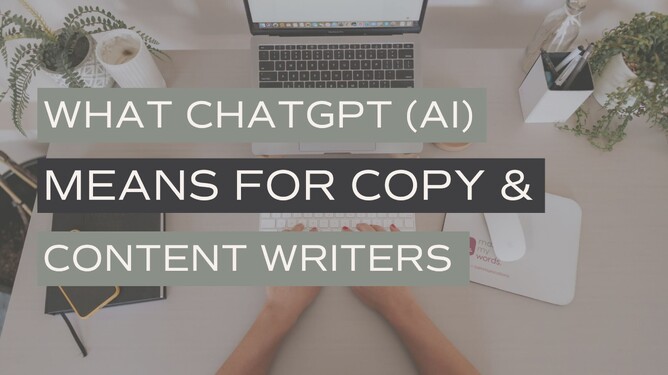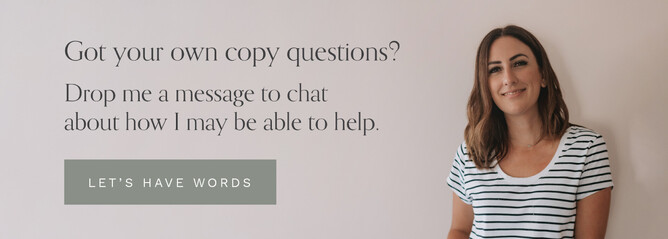Am I looking for a new career in 2023? Here’s my take on what chatGPT means for copywriters and content creators.
Reality is, we knew this day was coming.
And those of us who saw the writing on the wall (intended), have been evolving our value into messaging strategy, brand voice direction, sales psychology and UX content design, a research-based approach to understanding audiences, and services that extend beyond simply putting good-sounding words in the right order on paper.
That means AI (currently) is competition to me in the same way that a mediocre blog writer is competition to me. In other words. they're not. They’ve always been there, but there’s a reason that clients choose to engage a good copywriter instead:
- They want to differentiate with brand voice (aka personality)
- They want their messaging to align with the vernacular of their ideal audience
- They want to share verifiable fact and thought-leading perspective
- They need cut-through with creativity and insight
- They want justifiable, intentional content creation (ie. why that word in that place connects with the right person at the right time)
It’s true, chatGPT is impressive.
But it’s impressive because it’s a bot. If I put the same piece of blog copy in front of a client and asked them to pay $500 for it, would they feel quite so tickled with my output? If what you need is good-enough content that likely ticks a few keyword boxes, then sure, you’ve just reclaimed thousands on your marketing budget.
OK, naturally I’m bias towards defending my job description, but that’s not to say I don’t see its (potentially terrifying) capabilities as an opportunity for both me and my clients when it comes to content creation:
- We know the hardest part is getting started
AI can alleviate that blank-screen-cursor-blinking moment and take care of a (shitty) first draft (first drafts are always shitty, it’s the rules!). It makes writing more efficient, taking away the barrier of getting a few ideas out to get started. Even if you don’t want the bot to write a whole blog piece, you can ask it to offer up an outline (which won’t be perfect, but it’s a helpful start). It’s also handy for listicles, top ideas to cover and talking points. And, I’m wondering, have I essentially just found a new junior writing assistant to take some of my workload in my business? (One who doesn’t take holidays or a pay cheque.) - Handover that how-to content
If what your website needs is a bunch of rudimentary posts to get in Google’s good books then, again, a bot is a cost- and time-efficient way to get content creation underway. We know search engines love the what-where-why-how content that answers questions (especially in a world of voice-activated devices). And right now, I’m noticing that more of my clients are re-shifting their focus back to playing the long-game with good organic content, and reducing their spend on paid advertising. A bot could help pad out your SEO content strategy without the time-consuming creation that comes with it. - It helps to simplify complex concepts
Sometimes, we’re too deep in our own expertise to be able to articulate ideas and concepts in a way that a lay person can understand. That’s always been a part of the value of having a copywriter’s outside perspective. Now, AI can help take care of that for you, pulling together easy-to-understand language that helps you get your message across. Likewise, as a copywriter, my role is often to pull this information out of my clients’ brain (or from the vastness of the www). And while I wouldn’t recommend using a bot to help you with grunty, insight-based thought-leadership content, it does simplify the process when it comes to client interviews. It seems chatGPT can be a handy tool for actually providing question-starters for discovery interviews.
With all that in mind, I’m looking at chatGPT (and its AI counterparts) as a tool, not as a copywriter competitor. Sure, this is just the start for AI. It’s increasingly clever and engaging with natural language, but I’ve yet to see a bit of banter, personality and creativity that would genuinely reflect the brand voice of my clients. Here are a few more challenges to keep in mind:
- Outputs are only as good as inputs
In other words, the bot doesn’t know how to write, it knows how to respond. Instructions need clarity and specificity to actually deliver what you need. - Censor and curate what you’re sharing
The bot doesn’t fact-check or verify sources. The buck still stops with you when it comes to the accuracy and validity of what you’re sharing. - From what we’ve seen so far, bots show biases
Bots read everything on the internet - including the ugly stuff. There’s potential for your content to produce potentially harmful, non-inclusive language that doesn’t align with your business values. - Content still needs a customer (UX) lens
There’s more to copywriting than, well, writing copy. I consider ethical and inclusive language, buyer psychology, storytelling techniques, user experience and customer research in my writing. The writing is intentional; I can justify the placement of every message. A bot is not quite there yet. - Sometimes rules are made to be broken
The ways and means that we communicate have changed, so the rules have too. Memorable writing has rhythm; it creates tempo and flow. It uses sentence fragments. It starts sentences with ‘And’. Punctuation creates feelings of anticipation, curiosity, satisfaction and resolution. Pacing and pause matter. Sometimes creativity trumps correctness. Don’t believe everything a bot tells you (Grammarly, I’m looking at you).
I’m realistic that my role is just as vulnerable as any other when it comes to a tech takeover. But as we know, success comes to those who leverage and adapt, rather than resist. I’m keeping an open-mind when it comes to AI and certainly not dismissive of its potential, but there’s still very much a place for human, research-based understanding when it comes to crafting messages that get cut-through and that stick.
Have you had a play with AI writing tech yet? Do you see a place for it in your business? I would love to hear your experience.


